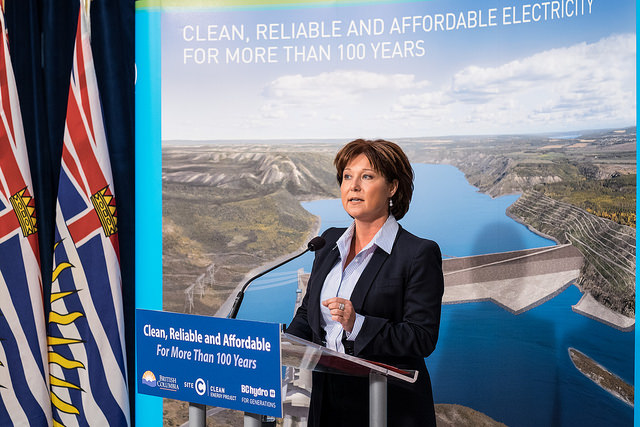Please support our coverage of democratic movements and become a supporter of rabble.ca.
In a tweet no doubt designed to complement an unabashedly political debate taking place in the legislature this week, the Liberal caucus stated that Site C is the most reviewed project in B.C.’s history, it will create 10,000 jobs and will provide affordable, reliable clean power.
The tweet is partially true. The problem though is what it leaves out.
There has indeed been extensive review of the Site C project, most recently in a comprehensive Environmental Review process. What there hasn’t been, however, is any independent review and consideration of the most fundamental question: is the development of Site C at this time in the public interest, taking all factors into account? The Environmental Review panel was not given the mandate to address this and the regulator that would normally examine the ratepayer and public interest, the B.C. Utilities Commission, was specifically ordered not to.
The fact is there has been no independently assessed business case or social benefit-cost justification of the government’s plan to build Site C. All we have is the commentary of the Environmental Review panel who suggested even if the project will be beneficial at some point, it may not be needed until the late 2020’s. There is no clear case to start construction at this time.
As for the 10,000 jobs, which in fact aren’t jobs but rather person years of employment, one of the more disheartening things for economists and public policy analysts is to hear politicians defending the expenditure of billions of dollars because of the short term employment that will be generated. If “jobs” were the objective then what would be better is to spend even more money. If $8 billion can generate 10,000 person years of employment then who knows, $10 billion might generate 2,500 person years more.
It is simply bad policy to justify the spending of more dollars than necessary because of the employment that will be generated. The simple reason is that dollars spent on one project will mean less dollars available to be spent on others or elsewhere in the economy. There is little reason to believe there would be any net employment gain from Site C over the long term taking into account what economists call the opportunity cost of the spending — what is foregone by less investment on alternative sources of supply or strategies, and less spending by customers who will ultimately have to devote more of their disposable income to pay for a higher cost of electricity.
And as for the tweet’s claim of affordability, the issue is whether Site C is the most economic or cost-effective way to proceed. What we can afford is one thing. What we need to spend is another.
The problem with the government’s Site C plan, as I said in a previous post, is that it doesn’t provide in an efficient and timely way the peak generating capacity that B.C. Hydro says it needs and by all accounts will be most valuable for the B.C. Hydro system. And, when Site C does come into service, it will provide much more annual energy supply than is required — energy that will have to be sold at a loss unless the LNG industry takes hold at a scale that no one but the premier is currently expecting.
An alternative approach would be to add peak generating capacity at the existing Revelstoke and GM Shrum hydroelectric stations. If needed, B.C. Hydro could very economically install single cycle gas turbine capacity. The gas turbines would not only be available to meet peak requirements, they could serve to back up the hydro system in the event of a severe drought. And B.C. Hydro could pursue much more aggressive Power Smart and demand side management initiatives, including the smart use of the smart meters — something B.C. Hydro has so far failed to do.
I do believe that large hydro projects can provide benefits that outweigh the significant impacts and costs they entail, particularly if they can be developed in partnership with directly affected First Nations and other communities. But partnership agreements for Site C aren’t there, nor is there evidence that the benefits will outweigh the very considerable costs. What evidence there is suggests otherwise.
Image: Flickr/bcgovphotos
Please support our coverage of democratic movements and become a supporter of rabble.ca.



